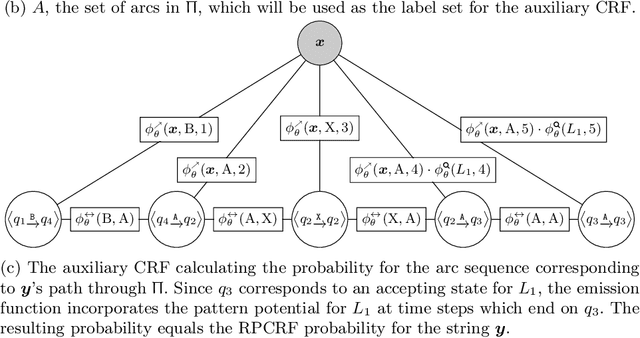Regular-pattern-sensitive CRFs for Distant Label Interactions
Paper and Code
Nov 19, 2024



Linear-chain conditional random fields (CRFs) are a common model component for sequence labeling tasks when modeling the interactions between different labels is important. However, the Markov assumption limits linear-chain CRFs to only directly modeling interactions between adjacent labels. Weighted finite-state transducers (FSTs) are a related approach which can be made to model distant label-label interactions, but exact label inference is intractable for these models in the general case, and the task of selecting an appropriate automaton structure for the desired interaction types poses a practical challenge. In this work, we present regular-pattern-sensitive CRFs (RPCRFs), a method of enriching standard linear-chain CRFs with the ability to learn long-distance label interactions which occur in user-specified patterns. This approach allows users to write regular-expression label patterns concisely specifying which types of interactions the model should take into account, allowing the model to learn from data whether and in which contexts these patterns occur. The result can be interpreted alternatively as a CRF augmented with additional, non-local potentials, or as a finite-state transducer whose structure is defined by a set of easily-interpretable patterns. Critically, unlike the general case for FSTs (and for non-chain CRFs), exact training and inference are tractable for many pattern sets. In this work, we detail how a RPCRF can be automatically constructed from a set of user-specified patterns, and demonstrate the model's effectiveness on synthetic data, showing how different types of patterns can capture different nonlocal dependency structures in label sequences.
 Add to Chrome
Add to Chrome Add to Firefox
Add to Firefox Add to Edge
Add to Edge